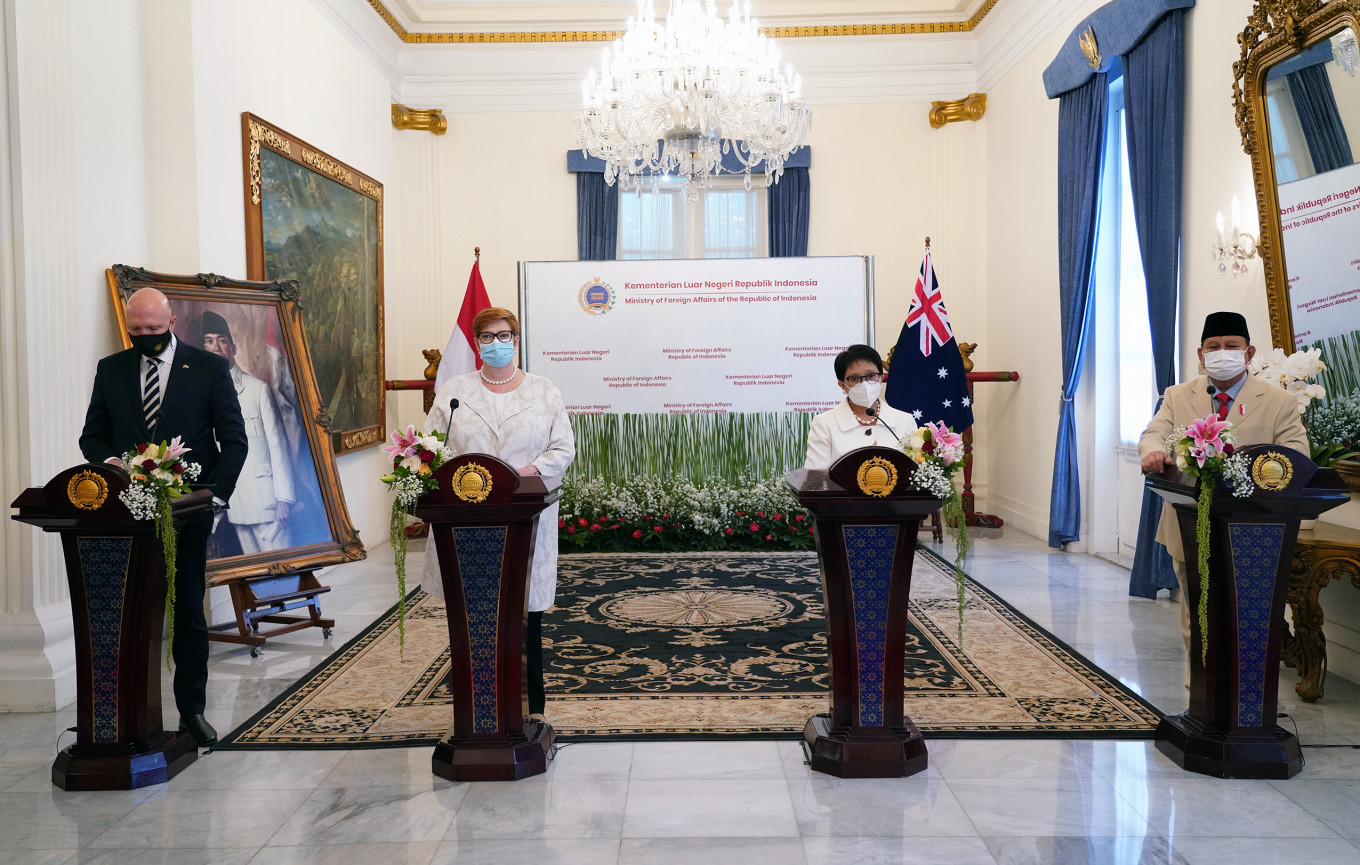Popular Reads
Top Results
Can't find what you're looking for?
View all search resultsPopular Reads
Top Results
Can't find what you're looking for?
View all search resultsLining up allies
It is no secret that the Indo-Pacific has been used to describe a regional order that expands on the Asia-Pacific by raising the stakes in the US-China rivalry.
Change text size
Gift Premium Articles
to Anyone
 Defense Minister Prabowo Subianto (right), Foreign Minister Retno LP Marsudi (second right), Australian Foreign Minister Marise Payne (second left) and Australia Defense Minister Peter Dutton attend a media briefing following their meeting at the Foreign Ministry in Jakarta on Sept. 9. (REUTERS/Indonesian Foreign Ministry)
Defense Minister Prabowo Subianto (right), Foreign Minister Retno LP Marsudi (second right), Australian Foreign Minister Marise Payne (second left) and Australia Defense Minister Peter Dutton attend a media briefing following their meeting at the Foreign Ministry in Jakarta on Sept. 9. (REUTERS/Indonesian Foreign Ministry)
A
fter years of being talked up, the Indo-Pacific has become the new central theater for global geopolitics. It has been buzzing with activity among regional players and even powers from further afield, who indulge in both collaborative and adversarial pursuits.
Russia kicked off on Wednesday its first-ever joint naval exercises with ASEAN member states, Arnex 2021, in the Straits of Malacca, which Moscow’s envoy has described as a “historic moment” for ASEAN-Russian ties.
The four-day exercise brings together the Indonesian Navy (TNI-AL), the ASEAN Navy and the Russian Navy in operations that put an emphasis on aspects of search and rescue and open sea encounters – issues that have been difficult to govern in the highly disputed South China Sea.
A day prior, Defense Minister Prabowo Subianto quietly spoke to his Chinese counterpart, Wei Fenghe, via video link, during which the Chinese official expressed hope that the partners would “handle disputes and disagreements with discretion” and “join hands in opposing hegemonism and a Cold War mindset”, according to Chinese media.
On Monday and Tuesday, the United States sent a senior diplomat to Jakarta – the second in as many months – to express Washington’s “fundamental concerns” about Chinese activities that could undermine the “rules-based international order".
On Thursday in Europe, Washington will hold talks with the European Union in their US-EU dialogue on China, first launched in March to address “increasingly convergent [...] outlooks on [China]”.
Both sides, which have introduced Indo-Pacific strategies of their own, are expected to issue a joint statement that reflects their shared analysis of “the challenges that [China] poses”, one US official said in a preview briefing.
France, a leading EU member state, sent its foreign minister to Jakarta last week to cement deeper ties in the Indo-Pacific, having agreed to start regular two-plus-two meetings between their defense and foreign ministers.
Even before that, foreign ministers from Australia and the United Kingdom also made stopovers in Jakarta, in part to calm nerves over their surprising three-way alliance with the US under the AUKUS security agreement.
It is no secret that the Indo-Pacific has been used to describe a regional order that expands on the Asia-Pacific by raising the stakes in the US-China rivalry, even as the ASEAN Outlook on the Indo-Pacific attempts to contain its excesses.
The ASEAN document itself has found much wider support, proving just how far the region has come as a central stage for competing geopolitical interests. But behind this newfound attention lies another disturbing challenge that is the antithesis of what Indonesia and ASEAN has stood up for.
Openly competitive versions of the Indo-Pacific strategy have at the very least complicated relations with Beijing, considering how worrying its territorial ambitions are.
It remains a fact that no single country in Asia can stand up to Beijing militarily. At the same time, the US comes in with its own military interests, based on shared values.
So, if all the commotion of the past few weeks is any indication of what we may expect in the years ahead, then Indonesia will need to pick its allies and partners wisely to prevent the country and the immediate region from getting pulled down by an increasingly tense superpower rivalry.










